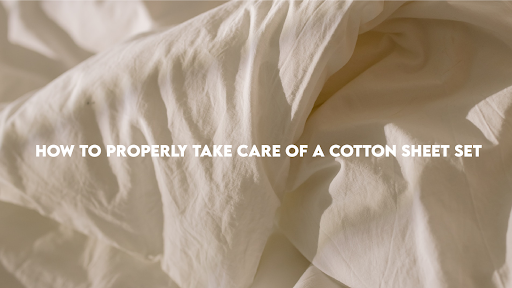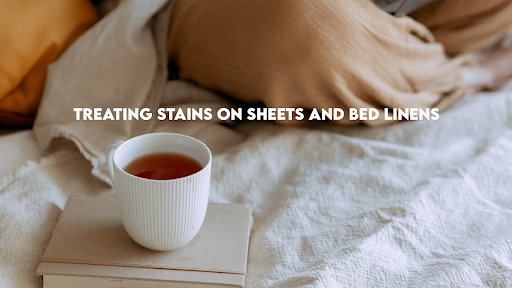
Have you ever thought of your sleeping status and realized that clean sheets play an important role too? With a wide variety of fabrics, weaves, and styles, it can be challenging to know how to care for them correctly. It is advisable to wash new sheets before using them and replace them every week. Fresh and clean bedding can help you sleep better. To maintain good hygiene, it is recommended to have three sets of sheets per bed: one for use, one for washing, and one for storage in the linen closet. This approach allows you to rotate your sheets regularly, minimizing wear and tear, and ensuring that you always have a new set of sheets ready to go on laundry day. Cotton sheets are a staple in most households. They are comfortable, soft, and easy to care for. However, if not taken care of properly, cotton sheets can lose their softness and durability, causing them to wear out faster. In this article, we will discuss how to properly take care of a cotton sheet set to ensure that they remain soft and comfortable for years to come.
Wash your sheets before first use
Washing your sheets before the first use is an important step in ensuring a good night’s sleep. Newly purchased sheets often have residual chemicals from manufacturing, as well as dust and dirt from shipping and storage. These irritants can cause skin irritation and allergies, making it difficult to sleep soundly. However, washing your sheets removes any potential bedbugs, dust mites, or other unwanted critters that may have taken up residence during storage or shipping. To get the best out of your new sheets, be sure to wash them in hot water with a mild detergent before use to ensure they are clean, fresh, and ready for a good night’s sleep.
Wash your sheets regularly
Washing your sheets regularly is an essential part of maintaining good hygiene and promoting better sleep. The average person spends about a third of their life in bed, so it’s important to keep your sheets clean and fresh. Regular washing helps to remove oils, and dust and keeps your sheets smelling and feeling clean. Experts recommend washing your sheets once a week in hot water to kill any germs or bacteria. So, if you want to enjoy a comfortable, healthy, and restful night’s sleep, make sure to wash your sheets regularly.
Use a gentle detergent
Using a gentle detergent to wash your sheets can be beneficial for both you and your bedding. Harsh detergents can strip away natural oils and irritate sensitive skin, leaving your sheets feeling rough and uncomfortable. By using a gentler detergent, you can preserve the quality and softness of your bedding, while also reducing the risk of skin irritation or allergic reactions. Gentler detergents are often more environmentally friendly, as they are less likely to contain harmful chemicals that can harm aquatic life. However, using a gentle detergent to wash your sheets is a simple yet effective way to improve the quality of your sleep and promote environmental sustainability.
Avoid over-drying your sheets
Over-drying your sheets can hurt their quality and lifespan. While it’s important to dry your sheets thoroughly, leaving them in the dryer for too long can cause them to become brittle and prone to damage. To avoid over-drying your sheets, consider setting your dryer to a lower heat or a shorter cycle. It’s also helpful to remove your sheets from the dryer while they are still slightly damp and finish drying them on a clothesline or drying rack. By taking these steps, you can help extend the life of your sheets and keep them feeling soft and comfortable for years to come.
Remove your sheets from the dryer immediately
Removing your sheets from the dryer immediately after the cycle is complete is a crucial step to keep them in good condition. When sheets are left in the dryer, they can wrinkle and become creased, making them difficult to iron and damaging the fabric fibers. Leaving sheets in the dryer for an extended period can lead to a musty smell and potentially even mold growth. By removing your sheets promptly from the dryer and either folding or putting them on the bed, you can ensure that they stay fresh and wrinkle-free. This simple step can help extend the life of your sheets and improve the overall quality of your sleep.
Iron your sheets
Ironing your sheets is a simple but effective way to keep them looking crisp and fresh. Not only does it remove wrinkles and creases, but it also helps to sanitize and disinfect the fabric, making it ideal for those with allergies or sensitive skin. To iron your sheets, start by setting up your ironing board and heating your iron to the appropriate temperature for the fabric. Then, begin at one end of the sheet and work your way down, smoothing out any wrinkles as you go. Remember to pay extra attention to the edges and corners of the sheet to ensure a perfectly pressed finish.
Rotate your sheets
Rotating your cotton sheet sets can help extend their lifespan. Having multiple sets of sheets allows you to rotate them, giving each set a chance to rest and recover between uses. This can help prevent excessive wear and tear, prolonging the life of each set. If you spill something on your cotton sheets, it is essential to treat the stain immediately. Blot the stain with a clean, damp cloth, and then treat it with a stain remover. Avoid rubbing the stain, as it can damage the fabric. However, avoid using hot water or bleach, as they can make the stain worse.

Tips and Tricks to keep your cotton sheets feeling crisp
If you’ve invested in a high-quality cotton sheet set, it’s important to know how to properly care for them. While many people simply toss their sheets in the wash with fabric softener every so often, there are other methods to keep them looking and feeling their best. Consider these 9 tips and tricks for maintaining the crispness and freshness of your cotton sheets.
Wash them weekly
Despite showering beforehand, our sheets become soiled while we sleep due to the accumulation of skin cells, body oils, dust mites, and bacteria. To maintain cleanliness and freshness, it’s important to change and alternate your sheets every week. Failure to do so will result in the accumulation of dirt and grime on your body during sleep. Moreover, the presence of bacteria can lead to illness, and frequent washing can effectively prevent the growth of bacteria.
Ditch the fabric softeners
Congratulations on starting to wash your American-made luxury cotton sheets weekly to maintain hygiene and reduce bacteria buildup. However, the next step is equally important. It is advisable to discard your fabric softener since it forms a layer on the sheet’s fibers, affecting their crispness and breathability. Fabric softener reduces airflow, leading to discomfort and overheating in both summer and winter. Therefore, if you desire fresh, crisp sheets, fabric softeners are not a suitable choice.
Don’t overload your washer
Kindly avoid overloading your washing machine as it can hinder the proper cleaning of your clothes. When the machine is overstuffed, the soap and suds from the detergent you use may not fully penetrate the sheets. If you notice that the clothes don’t fit, please do not force them in. Instead, consider splitting them into two loads and washing them separately as you can ensure that everything will be clean and fresh, just as it should be.
Iron your sheets
For maintaining the crispness of your cotton sheets, here’s a top trick. To achieve smoothness, the best option is to iron them as soon as you take them out of the dryer and use a relatively high temperature to iron them while they’re still warm and slightly damp. However, be cautious not to burn the fabric. Move the iron smoothly and swiftly, and avoid keeping it in one spot for too long, as this may cause it to burn through. To iron, use an ironing board rather than memory foam or latex mattresses.
Use starch
Adding starch to your fabric can create a smooth and silky texture, giving your sheets a crisp feel. It’s important to use the appropriate amount of starch to avoid overdoing it. Starch can enhance the structure of cotton sheets, making them fluffier and less prone to wrinkling. However, starched sheets are less likely to become soiled. Using starch can also be a helpful supplement to ironing, making the process more efficient and effective.
Make your bed every day
We understand that making your bed can be challenging, especially when you’re in a rush or busy getting your kids ready for school. It may seem like a waste of time to some, as they believe they will just get back into bed later anyway. However, it’s worth noting that making your bed can keep your bedding looking new for an extended period, much longer than if you leave it in a disheveled state. Your skin will also thank you for sleeping in a neat bed, and you’ll appreciate the difference between smooth, well-made sheets and those that are haphazardly tossed together. Properly making your bed every day can even make you feel like you’re staying in a luxurious five-star hotel.
Use more sheets and tighten
Hotels use a mattress pad to add extra cushioning to the bed and then place a fitted sheet over it. They go on to layer two flat sheets over the fitted sheet instead of using just one, which is what most people are accustomed to. By tucking the corners of the bed tightly, you can sleep comfortably between the flat sheets and the comforter. Thanks to the breathability of cotton sheets, they offer warmth in the winter and coolness in the summer. This creates a soothing, cloud-like feeling that can help you sleep soundly throughout the night.
Do not keep your sheets in the laundry
To avoid inviting mildew, it’s important to avoid leaving your sheets in the laundry for too long. The washing machine’s damp and dark interior can create an environment for mildew to thrive. Although the washing machine itself may not contain bacteria after a wash, the prolonged dampness can cause your clothes to develop an unpleasant odor and even transfer the smell to the washing machine. This can result in all your clothes smelling of mildew, regardless of what you wash them with, which is something you’d want to avoid.
Wash them properly
Although we provided a short overview of how often to wash and what to include in your laundry, there is a plethora of information to know. Generally, it is recommended to use warm water instead of hot water. Despite hot water’s ability to eliminate bacteria, it can cause the sheets to shrink, leading to a poor fit on your bed and undermining its overall durability. Make sure to check the care instructions label if your sheets have delicate trim or other features. For hard-to-remove stains on whites and lighter colors, use oxygenated bleach as you can pre-treat tough stains on your sheets to ensure they come out of the washer clean and clear.

Treating Stains on Sheets and Bed Linens
Stains can affect any kind of sheet as It’s inevitable that you’ll have to deal with removing stains such as food or drink spills, blood, or body oils from your sheets. Although using an oxygen bleach product as a pre-treatment is typically effective, occasionally you may need to take more drastic measures. The following are three of the most common types of stains that appear on sheets and their corresponding treatment methods:
Blood: To remove blood stains, it is best to avoid using hot water and opt for cold water instead. Soak the stained area in cold water to loosen the stain. Afterward, gently dab the stain with hydrogen peroxide and rinse it thoroughly. In case the stain persists, apply an enzymatic cleaner that is typically used for pet stains and then wash it as you normally would.
Cosmetics: This is a common method for removing makeup stains from clothing. The mixture of water and liquid dish detergent can help break down and lift the makeup stain from the fabric. It’s important to note that this method may not work for all types of makeup stains or fabrics. In some cases, it may be best to take the garment to a professional cleaner for specialized treatment.
Coffee: Prepare a solution by combining 1 quart of water, 1/2 teaspoon of liquid dish detergent, and 1 tablespoon of white vinegar in a bucket or bowl. Immerse the stained portion of the sheet in the solution and allow it to soak for 15 minutes. Rinse the sheet thoroughly and repeat the process if required. Finally, regularly wash the sheet.
Bedding Care Instructions
Cleaning bed sheets doesn’t have to be complicated or time-consuming. You don’t need to take them to a dry cleaner or spend hours hanging them out to line dry. Simply follow some best care practices that are designed to promote longevity and help your sheets maintain their beauty, just as they looked the day you purchased them.
A weekly schedule for changing and washing bed linens is preferred by the majority of people. However, it may be necessary to wash them more frequently in case of illness or to prevent stains after a spill. To keep the sheets clean without causing excessive wear and tear, it is advisable to establish a regular weekly washing routine.
Fabric pilling is an inevitable occurrence that affects all types of fabrics. Various factors such as body hair, nightwear, toenails, furry paws, and other abrasions contribute to its formation. Nevertheless, the good news is that you can reduce its occurrence by rotating your cotton sheets regularly. Our cotton sheets are designed to be reversible, providing you with one good option to choose from when making up your bed. However, ensure that you keep an eye on the label to determine the sheet’s orientation each time you flip it.

